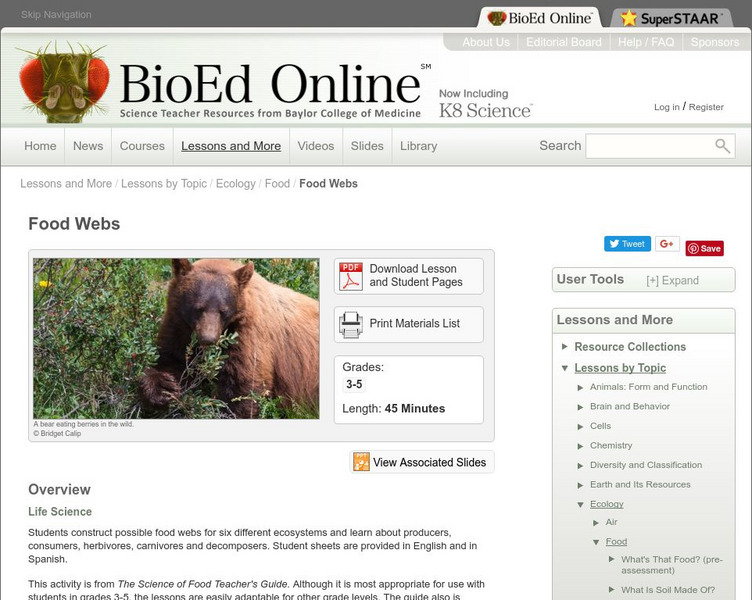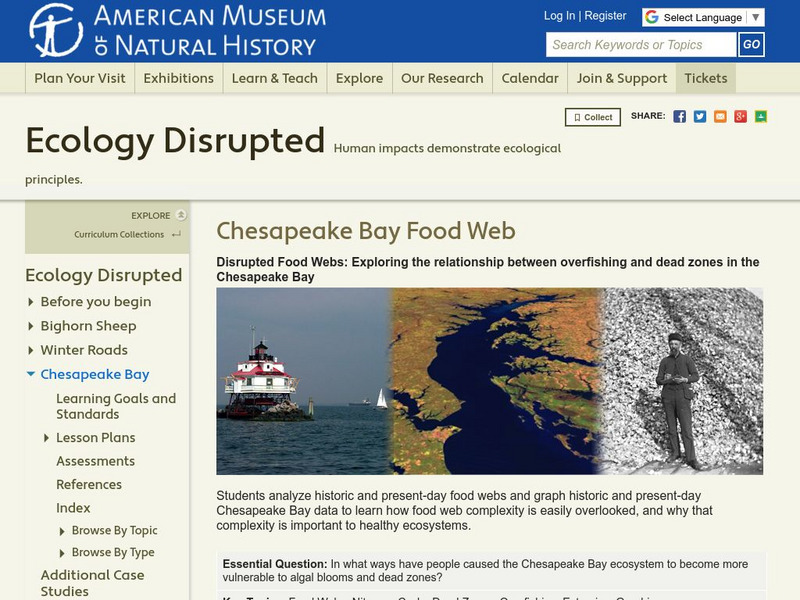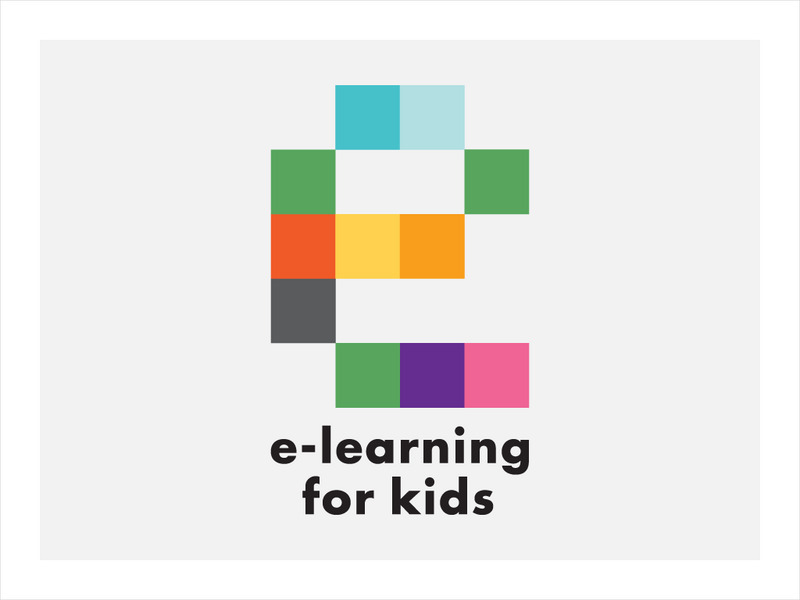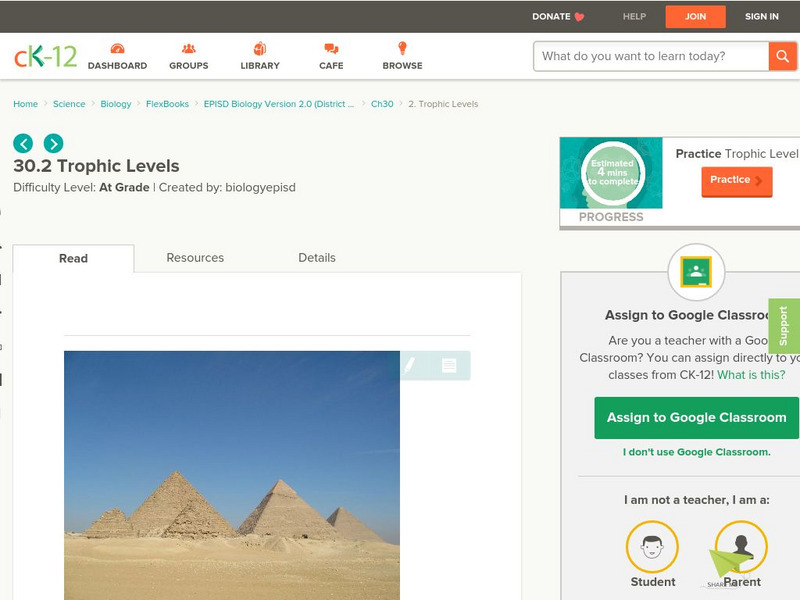Curated OER
An Interdisciplinary Deer and Human Population Study
Students answer the question, "What environmental problems arise due to animal and human overpopulation and what might need to be done to combat these problems?" They play games, graph data and write proposals about the question.
Curated OER
Ecosystem In A Bottle
Ecosystem activities show how everyone and everything is interconnected. The smallest change can make a big impact.
Curated OER
Termite Biology
Students explore the physical characteristics, distribution and habitat of termites. The lesson focuses on the termite as a social creature contrary to most other insects.
TeachEngineering
Teach Engineering: Food Chains and Food Webs
This lesson, supported by the provided power point lecture (LESSON 1 and 2 Ecology Lecture Supplement ), introduces students to the concepts of food chains and food webs. Through its use, students learn the difference between producers...
TeachEngineering
Teach Engineering: Constructing Sonoran Desert Food Chains and Food Webs
Is the food chain shown above accurate? Does the first link depict a producer, the second link a herbivore, and the third link an omnivore / carnivore? Students must correctly determine whether a species is a producer or consumer, and...
BioEd Online
Bio Ed Online: Food Webs
Students construct possible food webs for six different ecosystems as they learn about the roles of producers, consumers, herbivores, carnivores and decomposers.
CK-12 Foundation
Ck 12: Food Chains and Food Webs
[Free Registration/Login may be required to access all resource tools.] Videos, texts, activities, and assessments about food chains and food webs in an ecosystem.
American Museum of Natural History
American Museum of Natural History: Ecology Disrupted: Chesapeake Bay Food Web
In this comprehensive lesson unit, students examine how overfishing has affected Chesapeake Bay's ecosystem. They will study food webs from the past and present and graph related data.
E-learning for Kids
E Learning for Kids: Science: Titanic Shipwreck: What Are Food Webs?
Jorge is a cook in an underwater restaurant. He knows a lot about food webs. Dive in and learn about it with him.
Sophia Learning
Sophia: Food Webs: Lesson 1
This lesson will explain how to create a food web to show transfer of energy within a community. It is 1 of 4 in the series titled "Food Webs."
Science Struck
Science Struck: Difference Between Food Chain and Food Web
Explains the characteristics of food chains and food web; the different levels of producers, consumers, and decomposers; and the differences between food chains and food webs. Includes charts and a Venn diagram comparing the two.
Texas Education Agency
Texas Gateway: Organism Relationships: Food Chains, Webs, Pyramids
Given illustrations, students will analyze the flow of matter and energy in food chains, food webs, and ecological pyramids.
Annenberg Foundation
Annenberg Learner: The Habitable Planet: Ecology Lab
Create the parameters of your own ecosystem by choosing which producers and consumers live there. Visualize how the food web operates and species populations change. This simulator mimics the food web within a typical ecosystem and gives...
SMART Technologies
Smart: Ecosystem Food Chain and Food Web
Starts with living and non living and works through producers, consumers, food chains and food webs.
Massachusetts Institute of Technology
Mit: Open Course Ware: Courses: Civil Environmental: Ecology I: The Earth System
College-level online course highlighting the fundamentals of ecology. Course topics include coevolution of the biosphere, geosphere, atmosphere, and hydrosphere; photosynthesis and respiration; and the carbon, nitrogen, and water cycles....
Science Struck
Science Struck: Tropical Rainforest Food Web
Explains what a food web is, the complexity of one in a rainforest, and how energy flows through a food web.
Other
Zephyrus: Food Puzzle Chain
Answer these ten interactive questions about ecological feeding relationships by choosing the correct image that completes each food chain.
CK-12 Foundation
Ck 12: Fifth Grade Science: Life Science: The Flow of Energy in an Ecosystem
A module that explains what an ecosystem is and how energy and matter move through them. Students will look at the different roles of plants and animals and at ecological relationships in food chains and food webs.
National Center for Ecological Analysis and Synthesis, University of California Santa Barbara
Kids Do Ecology: Learn About Ecology
This resource provides information about ecology.
BioEd Online
Bio Ed Online: Bio Build Up
This activity allows students to make a simple model food chain and observe how toxic chemicals can become concentrated in the bodies of consumers at the top of the chain.
Sheppard Software
Sheppard Software: Parts of the Food Chain: Producers, Consumers, Decomposers
Learn how scientists classify different types of organisms in an ecosystem or in a food chain by their role and function as either a producer, a consumer, or a decomposer. Then play a game that tests your understanding of these important...
Georgia Department of Education
Ga Virtual Learning: Biology: Ecology I
A comprehensive ecology learning module where students assess the dependence of all organisms on one another and the flow of energy and matter within their ecosystems.
CK-12 Foundation
Ck 12: Episd: Trophic Levels
[Free Registration/Login may be required to access all resource tools.] Understand what trophic levels are and identify producers and consumers in a food web.
OpenStax
Open Stax: Energy Flow Through Ecosystems
Understand how organisms acquire energy and how that energy is passed from one organism to another through food webs and their constituent food chains.





















